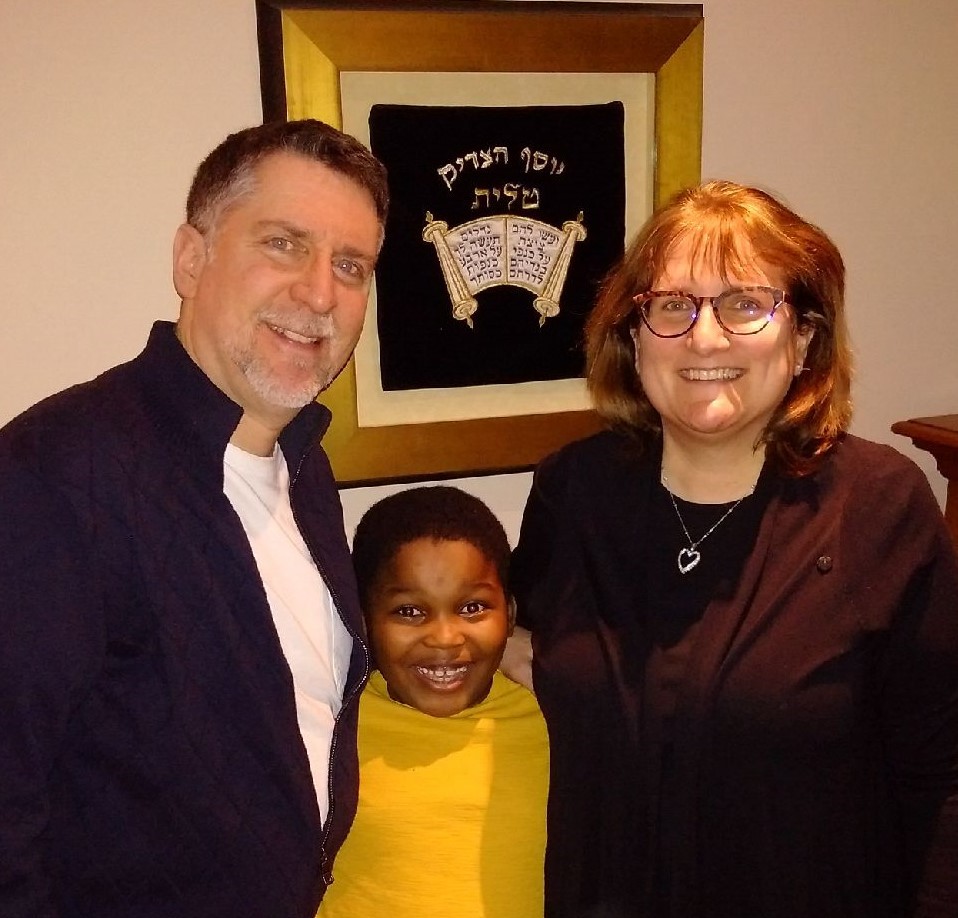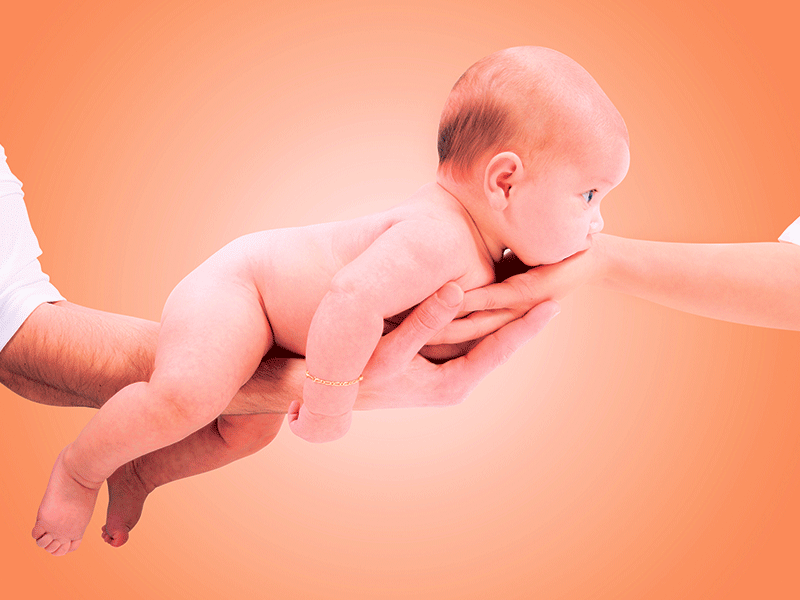Watching a loved one struggle with the physical, psychological and financial challenges associated with infertility treatment may elicit well-meaning outbursts like, “Well, why don’t you just adopt?”
What many don’t realize is that adoption can be just as difficult, stressful and costly as infertility – albeit in different ways – and may give way to parenting challenges that are unique to adoptive families in general, and Jewish families in particular.
First, it is important to note it’s a misconception that Judaism doesn’t welcome the concept of adoption.
According to the JCCA, formerly known as Jewish Child Care Association, a New York-based organization that offers a program called Ametz Adoption Program, caring for a needy child “supersedes the commandment to give birth to children. Traditional sources teach us that nurturing and raising a child are more important than giving birth… Adoption is not only acceptable, it is encouraged. Jewish law assumes that orphaned children will be cared for by others.”
READ: FAMILY DAY FUNDRAISER BENEFITS HOSPITAL FOR SICK CHILDREN
Despite this, the fact is that adoption is rarely a first option for families, and many couples must first come to terms with having “failed” to conceive a child naturally.
“It is in our genes that we want to replicate ourselves in terms of giving birth to children, and when that fails, we find people, if they can afford it… move to assisted reproduction,” said University of Guelph professor emeritus Michael Grand, who co-directed the National Adoption Study of Canada in 1993 and wrote a book called The Adoption Constellation: New Ways of Thinking About and Practicing Adoption.
“They look to that route, and if that one fails, they look to adoption,” he said.
Jan Silverman, an infertility counsellor who experienced infertility herself before adopting two children who were just days old when she brought them home, also talks about the concept of “failing” fertility before resorting to adoption.

“You go through the infertility crisis, and you fail at fertility, because you never do achieve that dream of having a child. Then you start on this adoption maze, when you start off with a home study. All of a sudden you’re being evaluated… ‘Why am I being scrutinized this way?’… ‘What else do I have to do to prove myself worthy of having a child?’” said Silverman, who is an advocate for couples coping with infertility, as well as adoption.
Once a couple is legally verified as “adopt ready,” which means they’ve completed a home study and adoption training, they have to be prepared for the financial cost of adopting. According to the Adoption Council of Canada, the costs can range from $3,000 to $30,000, depending on whether a couple chooses to adopt locally through foster care, through a licensed private agency or internationally.
For those to whom money is no object, often patience is a virtue. Wait times can take years, simply because there aren’t as many children available today for adoption as there used to be, explained Noelle Burke, an adoption permanency worker with Jewish Family & Child in Toronto (JF&CS).
“The landscape of adoption in the province has changed drastically. To give you an example, at Jewish Family & Child, we might have done significantly more infant adoptions 30 years ago, whereas now we do probably about, on average, three per year,” she said.
“If you look at the stats even for private adoptions… young parents are choosing not to place a baby for adoption. There are under 100 of those per year in the entire province,” as a result of factors that include more access to birth control, abortion and the lack of stigma associated with single women raising children.
Grand added that the more specific the potential parents want to be in terms of the age of the child, the sex of the child, the cognitive capacity, and the emotional history, the more difficult it becomes.
“If you go in and say, ‘I’ll take any child who comes my way,’ you have a far better chance of adopting a child than if you say I want a healthy, white infant,” Grand said.
Yet, even in those cases, another roadblock for Jewish couples is the fact that a woman who decides to place her child for adoption can choose from a list of hopeful couples.
READ: 10TH ANNUAL MITZVAH DAY ATTRACTS 500 VOLUNTEERS
“It has been more and more the practice that the birth parents are part of the process of choosing who the adopted parents will be. If there is a bias against a child going into a Jewish home, that may make it more difficult,” Grand said.
Burke suggested that couples advocate for themselves and give birth parents an opportunity to learn about what it would mean to be part of a Jewish family. “I strongly encourage them to advocate and say, ‘Let me tell you more about what it is like in my family as a Jewish person and let me tell you about my traditions and why I’m a fantastic resource for a child,’ and take the opportunity to break down some of the misinformation.”
Montreal-based mother Tanya Margolese said adopting a child was a “lifelong dream” of hers.
“Whether or not I’d have my own children, it was something I felt I had to do, to take a child who is in the world and doesn’t have what it needs, and to be able to give and provide for it,” said Margolese. She and her husband have four children – one biological, two stepchildren and one adopted.
She recalled the challenges associated with the two-year process and the search for “the youngest, healthiest child that we could get.”
Having chosen to pursue an international adoption in Ukraine, Margolese, her husband and youngest daughter, spent 2-1/2 “difficult” months in Ukraine to go along with the protocol outlined by the State Department of Adoption in Kiev.
“We went through what they called a blind adoption, basically. You go there not knowing who you are getting.”
She said families are granted appointments with the Ukrainian adoption department to choose a child out of a catalogue full of hundreds of photos.
“If you haven’t chosen a child by the third appointment, there is no fourth appointment, which is scary and it puts on a lot of pressure.”
Margolese and her husband connected with a young girl, who was seven at the time, and brought her home in 2012.
“She sat with us, but spoke no English, so we couldn’t really communicate verbally… but when she walked into the room, she took my breath away. It was a very touching moment.”
She said there were a few challenges in terms of helping their daughter adjust to a new life with an observant Jewish family.
“Her interpersonal interactions weren’t as strong as they should have been. I think her level of maturity was lower than it should have been. She had never really grown up in a family, so she didn’t know the various roles of the people in the family, and it took her a while to establish herself within our family in terms of her role as a daughter. They said she was a leader, and she came thinking she was a leader in our home, too,” she said with a laugh.
“Even today, I have to remind her who the mommy is.”

Elissa Gamus, a Toronto-based family lawyer, said she adopted her son following struggles with infertility, but said adopting a child wasn’t a last resort because she couldn’t get pregnant.
“I got married later, and we experienced infertility issues, but I [intended to] have a child through fertility and a child through adoption,” she said.
Gamus and her husband enlisted Michael Blugerman, one of Ontario’s most experienced adoption counsellors and facilitators, to help them through a private adoption.
But Gamus said she was “very, very lucky” to successfully adopt her son, Joseph, from birth.
“A girlfriend of mine is a midwife, and she had a patient who was looking to place her son for adoption and she mentioned it to me. We were seeing Michael at the time for other opportunities, and he said, ‘It’s not going to happen. Joseph is black and in the black community, the families keep their children, even if it means that the grandparents will raise him, so forget about it,’” Gamus recalled.
But they went ahead through the legal process and red tape and were able to finalize the adoption without a hitch.
“One of the things that was addressed to us was that adopting a child out of your race, and who is not visibly of your race, [would present challenges,]” she said.
“Joseph is visibly black, and his personality, like the way he walks, his interest in certain things, he connects both with the Jewish community and with the black community.”
Gamus said Blugerman explained to them that adopting a black child into a Jewish family is much less common than adopting Asian or Russian children, and warned her to “be aware that you are going to have some challenges.”
Beyond the social challenges, Silverman said there are differences between raising a biological child and an adopted child.
“When you adopt, there are differences. You can talk about it being exactly the same, but it’s just not… My daughter didn’t finish high school. I have two friends in the Jewish community whose kids didn’t finish high school, but other than that, they all went to university. The commonality in that is that they are also adopted,” she said.
READ: JEWISH DISABILITY MONTH SEEKS TO RAISE AWARENESS
Silverman said it’s natural to point the finger at the parents, but that is usually not the issue.
“I’m a really good mom. There were other issues that were involved… I have two successful adoptions. I have two really good kids. But there is a recognition of difference [between having biological children and having adopted children]… The fact that my daughter’s birth mother only went to Grade 8… we know that there is a higher incidence of learning disability in the adoption community. It’s true. It’s not that biological kids don’t have learning disabilities, but the percentage is higher,” Silverman said.
“We want to deny the heredity and think that it is all about environment, nurture over nature, but it’s not. A line I learned at an adoption conference once, which I love, is that we are nurturing nature. And I think that is brilliant and that says it all.”
